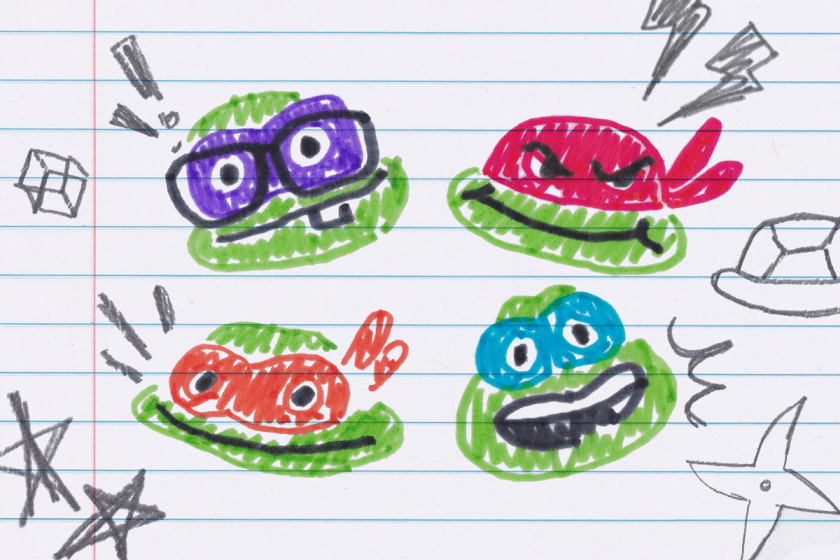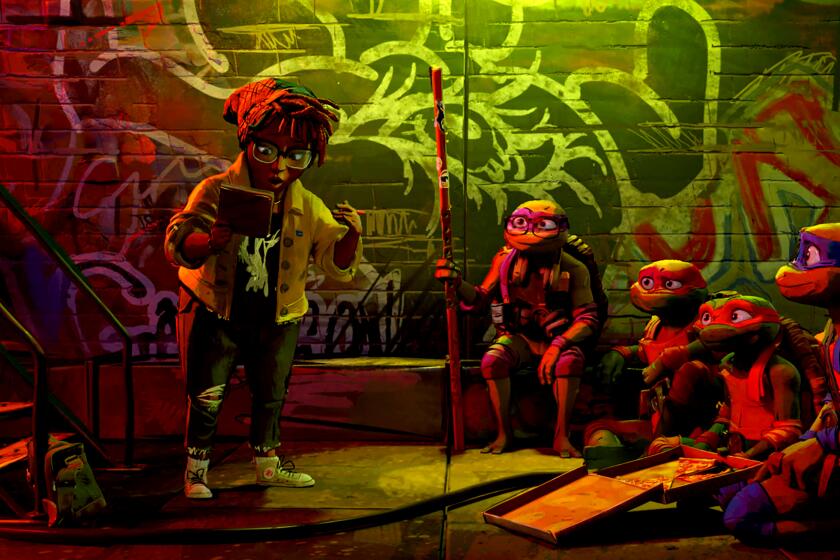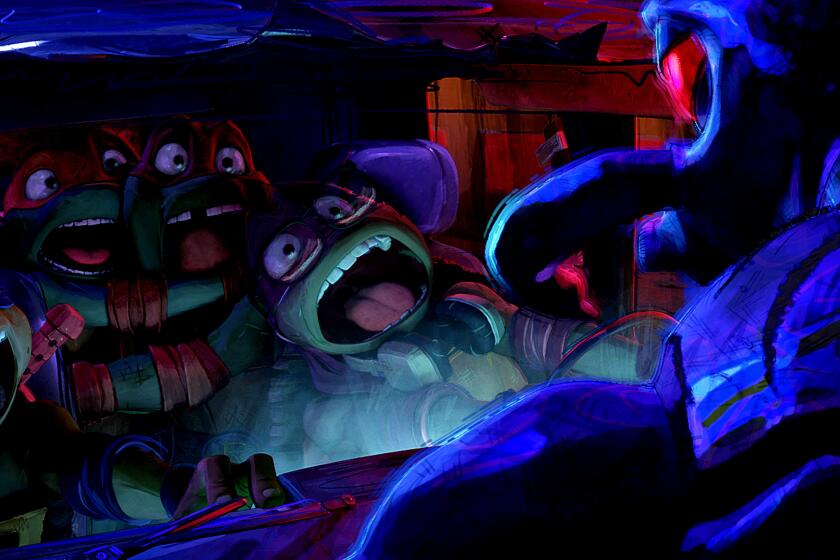With ‘Ninja Turtles’ and ‘Paw Patrol,’ Paramount’s animated franchise strategy pays off
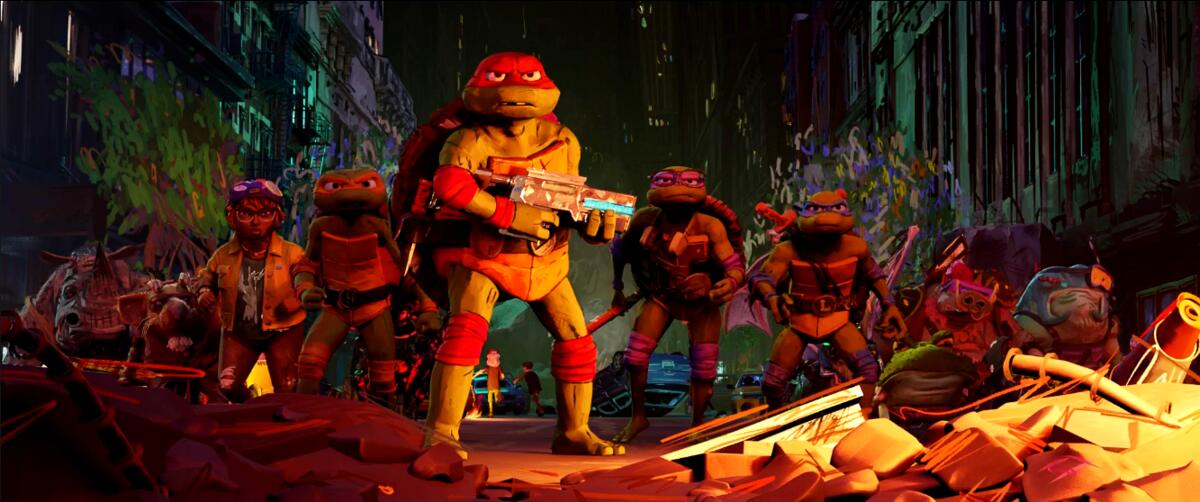
- Share via
Earlier this summer, a set of five frozen pizza boxes began populating the freezers at Walmart. But DiGiornos these were not; these pizzas featured the masked visages of the world’s most famous crime-fighting turtles.
Yes, the Teenage Mutant Ninja Turtles.
Inside the business of entertainment
The Wide Shot brings you news, analysis and insights on everything from streaming wars to production — and what it all means for the future.
You may occasionally receive promotional content from the Los Angeles Times.
From July to December, 1.2 million boxes of TMNT-branded frozen pizzas, costing about $6 a pop, were sold in the U.S. Reviews popped up on YouTube, Reddit and TikTok as fans collected the boxes and debated the turtle-topping pairings: Is Raphael a sausage pepperoni kinda guy? Should Leonardo be plain cheese?
The pizzas were one element of Paramount’s marketing and consumer products blitz for this year’s “Teenage Mutant Ninja Turtles: Mutant Mayhem,” the first theatrical Turtles film since 2016.
For top executives at Paramount, the successful revitalization of the TMNT brand wouldn’t just take ticket sales. Instead, Paramount sought to create an overarching strategy crossing consumer products and experiences to help make “Mutant Mayhem” feel like the start of a new Turtles era — winning over old and new fans to watch the films and shows, buy the toys and, of course, eat lots of pizza.
“We’re not just making movies to sell toys,” said Paramount Pictures and Nickelodeon President and Chief Executive Brian Robbins in an interview at the Paramount Pictures studio lot in Los Angeles. “We’re making movies to make great movies. And if we make great movies, for that audience, for that demo, with properties that have proven play patterns, then the rest will come.”
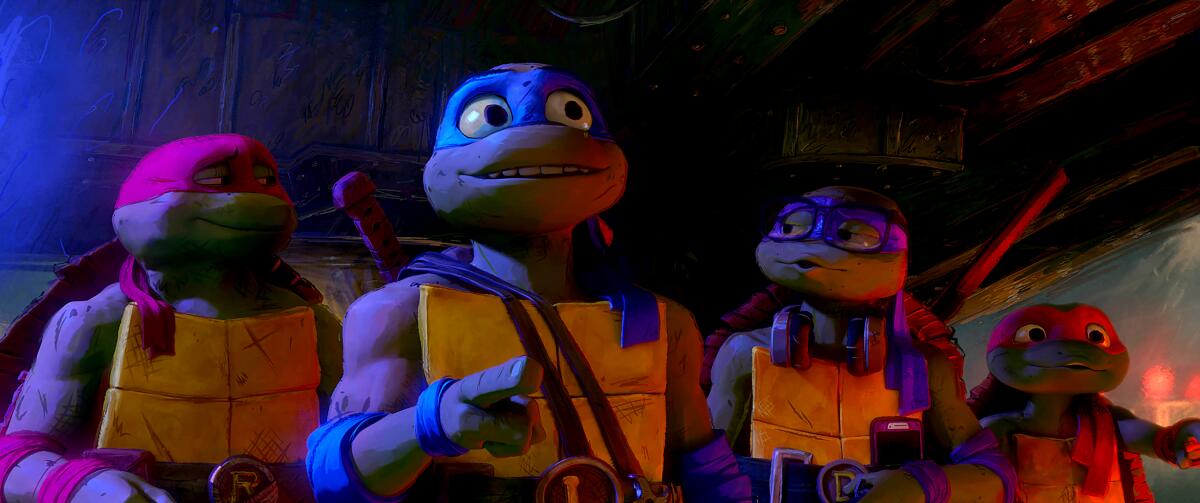
From Paramount’s perspective, the plan worked. “Mutant Mayhem” grossed a decent $180 million at the box office on a $70 million budget. The TMNT franchise is projected to drive $1 billion in retail sales, driven by products like the frozen pizzas and “Mutant Mayhem” action figures from longtime TMNT toy maker Playmates. That’s a spike coming after the modest prior $10 billion in lifetime sales from the 39-year-old TMNT franchise.
Paramount replicated this strategy with its preschool-focused sequel “Paw Patrol: The Mighty Movie,” which grossed $195.6 million worldwide from a $30 million budget and boosted Paramount+ viewership. Retail sales of Paw Patrol–themed items (think: toothbrushes, Crocs, pajamas and books) generated roughly $1.5 billion, helping Paramount bring in $2.5 billion in retail sales from TMNT and Paw Patrol this year.
With this animated feature directed by Jeff Rowe (‘The Mitchells vs. the Machines’), a decades-old franchise hits an unexpectedly delightful high point.
Those figures, generated by just two titles, pale in comparison to the billions brought in by consumer products behemoth Disney, which drove $61.7 billion in global retail sales during 2022, according to a report from License Global. But Paw Patrol and TMNT are wins for Paramount, whose theatrical animation business has long struggled. Though Paramount Animation’s first movie, “Rango,” won the 2012 Oscar for animated feature, many of its subsequent releases, such as “Sherlock Gnomes” and “Wonder Park,” bombed.
“Paw Patrol: The Mighty Movie” and “Mutant Mayhem” are feathers in the cap for Robbins, who was tapped to lead the film studio in 2021 after holding top positions at Paramount Players and Nickelodeon.
The animated success came in a year when some of Paramount‘s big swings, including “Dungeons & Dragons: Honor Among Thieves” and “Mission: Impossible — Dead Reckoning Part One,” disappointed theatrically. For the first nine months of 2023, Paramount’s film segment posted an operating loss of $143 million.
Since taking the reins, Robbins has zeroed in on franchises to build up the studio, which has been caught up in Paramount Global’s last decade of separations, mergers and shakeups. The saga continues today, as owner Shari Redstone reportedly considers selling a controlling stake in National Amusements, which owns the majority of Paramount Global’s voting shares.
Paramount Pictures originally conceived its new movie “Monster Trucks” as fuel for its upstart animation business.
Two years in, Robbins’ plans are clear: go all-in on established IP, including in animation. In 2025, the studio’s film slate will include three animated franchise plays surrounding the Smurfs, SpongeBob Squarepants and fantasy property Avatar: The Last Airbender. By 2026, the third “Paw Patrol” film, in partnership with toy maker Spin Master, will head to theaters.
Along the way, Paramount will again use its marketing prowess to juice its consumer products and experiences division (think: coffee, clothes and pet products for “Mean Girls” fans tied to upcoming live-action movie musical; drinkable yogurt, branded toothbrushes and games for the Paw Patrol and SpongeBob set).
How Evan Goldberg, Seth Rogen and the director of “The Mitchells vs. the Machines” gave their heroes novice-level action and a vulnerability not previously present.
“We talk constantly about what’s happening in the film business, we talk about release dates, we talk about marketing, and it is a really collaborative approach when it comes to franchise films like Turtles and Paw Patrol,” said Pam Kaufman, president and CEO of international markets, global consumer products and experiences for Paramount.
“Our retailers and licensees ... know when they’re partnering with Paramount, not only are they partnering on a show and a film... that translates into great products,” Kaufman said. “Our company will get behind it across all platforms and all markets.”
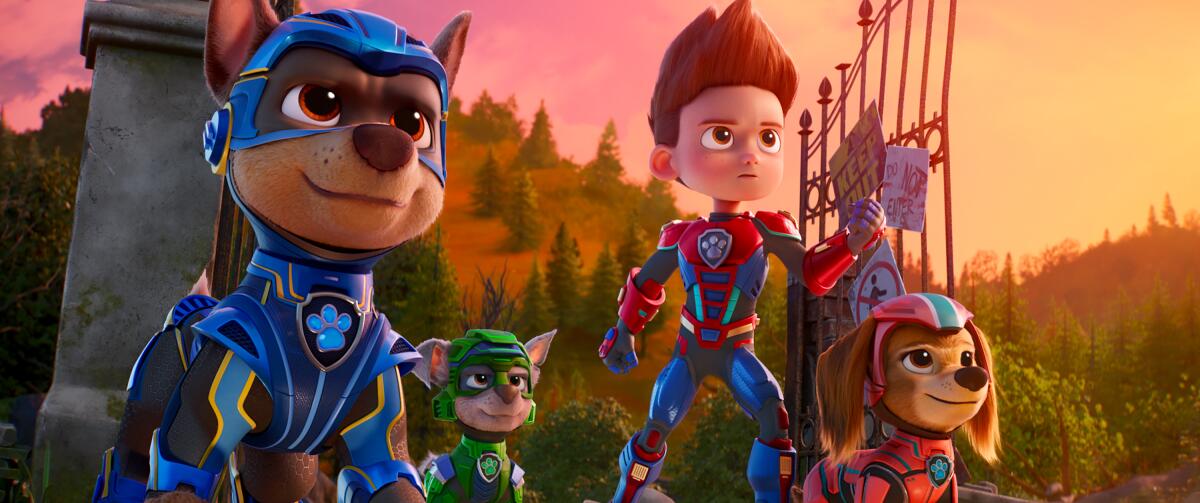
Robbins said he had to fight to get the first “Paw Patrol” movie and “Mutant Mayhem” made, lobbying and getting the support of Paramount Global Chief Executive Bob Bakish when others didn’t see the theatrical potential for preschooler and teen fare. At one point, Robbins — prior to leading the studio — was so dead set on making the “TMNT” film that he remembers thinking he’d find another partner to make the movie with if Paramount passed.
“I would say to Bob Bakish, ‘I’m doing it,’” Robbins recalls. “He would say, ‘Let me talk to the studio.’ Then the studio would go, ‘We shouldn’t do it. I don’t want to do it,’ ... and I’d be like, ‘No, I’m doing it. I’m doing it. I’m already doing it. You can’t stop me from doing it.’”
The emphasis on animated franchises isn’t a coincidence. The longer production time helps the studio space out sequels to help build excitement and avoid audience fatigue. And given Paramount’s past animated flops, the focus on existing IP is a safe bet as original animated movies like Disney’s “Wish” struggle at the box office.
“There’s one school of thought that audiences want more of the things they love,” Robbins says. “But they love the things they do because they’re good, so it goes hand in hand. And if the audience has a bad experience, they move on, right?”
As an example, Robbins points to TMNT, which needed a reboot after Michael Bay’s 2014 and 2016 films featuring turtles that looked more like ‘roided-out vigilantes than children’s action heroes. Robbins says he sought the advice of longtime TMNT toy maker Playmates. Their main suggestion? Ditch the live action and go back to animation.
From there, Robbins and Paramount Animation and Nickelodeon Animation President Ramsey Ann Naito thought of Seth Rogen, who they had a hunch was a TMNT fan.
“I picked up the phone right then and then I called Seth and I was kind of sheepishly like, ‘Hey, man, were you ever a Turtles guy?’” Robbins says. “He just talked for 45 minutes straight. And the next day, literally the next day, he and his partner were in our studio at Nickelodeon in Burbank.”
In addition to balancing out its star-studded cast with young newcomers to voice the main leads, “Mutant Mayhem” felt like an homage to the original cartoons while still being stylistically distinct and different for audiences, according to David Neumann, a former CAA agent who now runs animation production company Newmation.
“I actually really appreciate what Paramount was going for in terms of trying to reinvent themselves and do an interesting style,” Neumann says. “It’s showing overall that audiences want something that’s new and that’s fresh.”
He also commended Paramount for being able to do “Mutant Mayhem” on smaller budgets than $200-million animated projects like Disney’s “Wish” and Pixar’s “Elemental.”
If Paramount plays its cards right, Neumann says, the franchise successes should give the studio more freedom to take risks with new stories. But the animation executive worries that Paramount’s franchise plans will come at the loss of investments toward new, untested storylines and characters that aren’t guaranteed hits but may become the next big thing.
“[Studios are] afraid of producing originals that already don’t have the built-in audience because they can lose out on their investment, and I respectfully disagree with that,” Neumann says. “It’s not to say you shouldn’t be doing that. But it’s not to say that you should only do it. And unfortunately, I think that is what they’re going to be doing for the near future.”
For film buffs who cringe at the sight of so many sequels and remakes, Robbins says the quality is there.
“Even with ‘Paw Patrol,’ you might say, ‘Oh, it’s preschool property,’ but that first movie was loved,” he says. “We exceeded people’s expectations of what they thought a ‘Paw Patrol’ movie could be. We exceeded people’s expectations on Turtles from the quality of the movie.”
More to Read
Inside the business of entertainment
The Wide Shot brings you news, analysis and insights on everything from streaming wars to production — and what it all means for the future.
You may occasionally receive promotional content from the Los Angeles Times.
